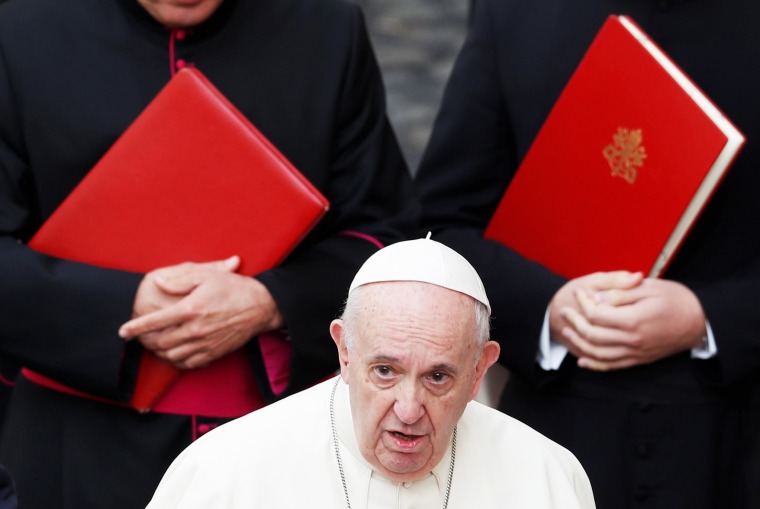ROME — Pope Francis has declined Secretary of State Mike Pompeo's request for an audience, amid fears a meeting could drag the Catholic Church into the U.S. presidential election political fray, according to senior Vatican officials.
"Yes, he asked. But the pope had already said clearly that political figures are not received in election periods. That is the reason," Secretary of State Cardinal Pietro Parolin told Italy's main news agency, ANSA, at a press conference on Wednesday.
While the pope does tend to avoid meeting politicians ahead of elections, the pontiff has also come under pressure from Pompeo to denounce human rights abuses in China.
The Vatican did, however, confirm its senior diplomatic officials had "serene and cordial" discussions on Thursday with Pompeo, with both parties laying out their "respective positions regarding the relationship with the Republic of China."
Pompeo, who traces his ancestry to Italy, is in the country as part of a broader European tour including Greece and Croatia.
The rising tensions with the Vatican come as Pompeo urges the Catholic Church to use its "moral authority" and "capacity to influence" to denounce China's record on religious freedoms.
The State Department did not respond directly to the Vatican's comments.
On Wednesday during a speech in Rome, Pompeo singled out China, saying that the Chinese Communist Party "works day and night to snuff out the lamp of freedom, especially religious freedom, on a horrifying scale."
China has previously faced fierce international criticism, including from the United States, for its treatment of Uighur groups, a predominantly Muslim minority living in the northwest Xinjiang area — who say they face mass internment and repressive measures against their religion.
Beijing has repeatedly denied any mistreatment of the Uighurs and insists its actions have been taken to combat terrorism.
Pompeo's comments come as the Holy See nears the end of a two-year agreement with Beijing that gives the pope some say over the appointment of Chinese Catholic bishops. It is due to expire next month, but is largely expected to be renewed.
Vatican officials say the agreement with China is not perfect but call it a step forward, after decades during which Chinese Catholics who recognize the pope were driven underground.
An outspoken critic of China, Pompeo did not directly address the Vatican agreement with Beijing in his speech, but urged the church not to let "earthly considerations" discourage "principled stances." He also cited examples of churches and shrines being "desecrated and destroyed" in China.
China has consistently rejected accusations that it represses religious freedoms.
Download the NBC News app for breaking news and politics
Pompeo's public criticisms of the Vatican deal ahead of his visit, including an op-ed and a series of Tweets warning that the "Vatican endangers its moral authority, should it renew the deal," came as a "surprise," Vatican officials said.
"Normally when you're preparing these visits between high-level officials, you negotiate the agenda for what you are going to talk about privately, confidentially. It's one of the rules of diplomacy," the Vatican's Foreign Minister Archbishop Paul Gallagher told reporters when he spoke alongside Parolin.
President Donald Trump has increasingly taken a hard line towards China on issues of trade, Hong Kong and the coronavirus, and the country is set to be a center piece in the debates ahead of the Nov. 3 presidential election.
Trump is also strongly associated with conservative Protestant and Catholic movements, many of which have been critical of Pope Francis's stance on issues from immigration to climate change.
Claudio Lavanga and Abigail Williams reported from Rome; Adela Suliman reported from London.
Reuters contributed to this report.


